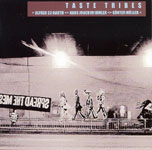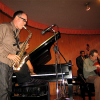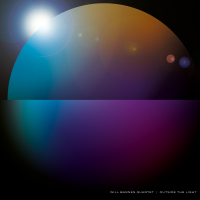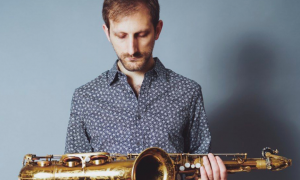Home » Jazz Articles » Interview » Alfred Harth: Forty Years of Synaesthetic Improvisation
Alfred Harth: Forty Years of Synaesthetic Improvisation
AH: But this is only part of what I'm doing now. On the other hand, I have also done concerts with [guitarist/turntablist] Otomo Yoshihide and did about six CDs with him since about 2004 (as well as some diverse compilations). I met him in the middle 90s, he was contacted by Chris Cutler who had produced a CD of Ground Zero, where he had sampled Goebbels-Harth, and it was a milestone of Otomo's work where he became a bit famous. This was how we got to know one another and he stayed at my home in Frankfurt in 1998. He came to do a concert in Seoul a bit later and then his saxophonist left the band and I filled the chair with my own contributions. He's a very open person, to many fields in music—I don't know about his tendencies towards art and literature, but he's a unique artist.
Later I was facing again towards the European scene, the younger scene in Rome around Massimo Pupillo and the band Zu. Die Schachtel has put out a project we did called 7000 Oaks (7k Oaks), and there's another trio with Gunter Muller and Hans-Joachim Irmler from Faust called Taste Tribes. There is another thing I'm doing with [electronic artist] Conrad Schnitzler. It's a coincidence that now I'm doing some work with names from the Seventies also, like Manuel Gottsching from Ash Ra Tempel—I knew their names then but had not played with them until now.
AAJ: Do you plan to stay in Korea?
AH: I'm feeling good here and it feels like home, but that doesn't mean all my artistic works are defined by living here. It's like people who live in New York may play their music all over the world.
AAJ: But you almost moved to New York in 2001.
AH: That's right, I was looking for a change of scenery from Germany and we came very close to living there around that time. My wife was having an exhibition in 1999 in a gallery and took part in a grant. Her feet were on the ground and I had been working in the 1990s with New York musicians. During the year 2000 I met [bassist] Wilber Morris and played with him, and he chose Kevin Norton as our drummer and that formed the Trio Viriditas. We did two recordings for Clean Feed in 2000-01. But Wilber died and it had to end.
As for choosing a place to live, we did the research on living in New York and looked at the apartments and it was too expensive. This was in September 2001 and then we saw the incredible things that happened in New York. Since then, all the aftermath of the politics has made us turn away and we haven't felt a lot of sympathy for America. There was a big exodus of artists from New York and it confirmed my decision not to live there. But it's all very sad and I want to go there again when things have improved.
So my wife had an invitation to a biennale in 2000 and I joined her on this trip to Asia. During this trip I had an occasion to do some concerts in Seoul with several of the most famous players of free music here. I was very astonished and attracted to the country after a couple of weeks. In 2001 we got a grant to spend six months in Seoul at an art space, and it gave us a place to live and a chance to leave Germany for a change. This was a perfect start for me to get grounded. Of course I wouldn't have had this connection if I wasn't together with my wife, so it is in many ways a love story!
 AAJ: Did your interests change as a musician in Korea?
AAJ: Did your interests change as a musician in Korea?
AH: I had stayed my whole life in Frankfurt and felt it would be good to change for many reasons. I wanted to get out of somewhere that was a bit stagnant and it was good to move on and get rejuvenated. That's exactly what happened by coming to Asia, which provides a different world and an altogether inspiring place. I was not expecting things—I was just open to change. Frankfurt needed new faces as well. Japan, Hong Kong and Vladivostok are nearby—it's a new radius for me from the places I was used to in Europe.
AAJ: Could you talk a bit about the Korean musicians you came into contact with?
AH:There is an alto saxophonist, Kang Tae Hwan, who is a unique master of the music with circular breathing in extended ways—a very free and outrageous player who's often sitting down in a Buddhist position. There's a trumpet player Choi Sun Bae, a very close friend who has been compared by other people to Bill Dixon. Those two are not very well recognized, and even here—there's an astonishing degree of ignorance and nobody supports this music. It's much better in places like Japan. There are others who have mastered traditional instruments who have also not been recognized, but this seems to be the Korean thing.
AAJ: Is Korea known for being unsupportive?
AH: It's a sort of hermit situation, and they are not encouraged to give a certain image to the world. They don't have an idea about their own reputation, and when it comes to the cultural figures there are no names. There was the drummer Kim Dae Hwan, who passed away, that played in Japan regularly—he was really unique, holding four or five sticks in his hands, running the motor of his motorcycle on stage, really strange and free. It's nice to look into this universe that nobody knows about.
AAJ: Is there a chance to do some more recordings with Korean players?
AH: I produced a solo record of Choi Sun Bae, and I would love to do more that exposes them. This would be something new for many people.
AAJ: How much planning goes into your recordings beforehand?
AH: I go into them as an intuitive; from my background I'm kind of a thinker compared to some others, so I can trust that capacity. Of course it happens when there's a project that requires more thought, I can do that, but my personal work is more intuitive. I pick up some contents that trigger my ideas, such as the history of Korea and the Japanese occupation that moved me very much as a German because of the injustices we'd done to the world. Many things are not told these days from the Japanese side—they didn't apologize and they denied things, so this created a new border and hinders the new politics. So when I learn about those things it triggers a wish to put something together and speak about it.
AAJ: I notice you've included poetry in some of the Mother of Pearl discs.
AH: Yes, each of these discs contains another item in a modest way—it's not easy for me to speak about the language and history as an outsider, but I was approaching the country and its richness as an artist as best I could, with my feelings and experience. Now that series has been finished, and though I'm still living here I'm doing things elsewhere. I'm going to Switzerland and Portugal, and will be working with Taste Tribes—I am fascinated by the electronic possibilities of the Kaoss pad, contact mikes, laptops and the things Gunter and Hans-Joachim will bring to the table. There's a psychedelic/electro-acoustic aspect to the band, a new approach that I find very satisfying. The CD is a studio work that I had mixed while here. I call it Taste Tribes because it is in-between; it has something to do with modern times as well as with older forms, Krautrock and so on.
AAJ: And at the same time you're revisiting prior work with EMT and Just Music.
AH: Yes, I had found these tapes and cleaned them up and put them on CDs that I hope to reissue at some point.
But with Taste Tribes, it's very far from jazz as there are shadows of saxophone tone in it, but it's all electronics and it is very challenging.
AAJ: How have you been received in Seoul as an artist and musician?
AH: It's very strange; at first it was open because they knew my name and it was a warm welcome, and I built up relationships with younger experimental musicians. And then it faded a little bit because I began concentrating on working with Otomo in Japan and now I've withdrawn from activities in Seoul because I'm going my own way—and it's a natural movement but it's a bit less of a collaboration. But I feel well, and I think I'll remain living here—life is great here.
Leaving in the sense of doing more activities in Europe and elsewhere is something I would like to continue to do. But I will always come back. If I go to the States, it would be under the auspices of connecting to new musicians and exploring new scenes; I'm just so open. With Otomo, things are fading a bit because now he is searching for other new ways that are not the same as mine—he's playing more guitar and working with [saxophonist] Mats Gustafsson's Thing. The big band, ONJO, is no longer working together—it's already a part of history. Everybody is searching for a new way.
class="f-right">
AAJ: What's interesting to me is that the most visible of your recent recordings is within more of a jazz context, Trio Viriditas, which involves so little of your working process. Do you have thoughts about that, getting noticed for something which is just a certain aspect?
AH: I think not many people know my work in the first place, and that's a little sad. My other friends get more recognition, and it's always that which makes you fly and motivates you a bit. I'm not too happy about not being so well-known; it's not that I need applause every day, but I do need something to keep going on!

But the point is to have among your diverse talents that of selling yourself, and that's not a talent that I have. I want to show myself and put myself in the position that people can see what I've done in a better way—but I accept less recognition and try not to get down about it. I continue working, I don't do many concerts, and that's how it is. Even if it all goes down into a hole I will thankfully accept it!
AAJ: Do you still teach at all?
AH: No, no, I did that only in the Seventies before getting famous with Heiner Goebbels. That put me in a good position economically, while I was also doing compositions for theater and for television which paid very well. From there on I could invest my money, so I am in the position of being independent from economic worries and I'm very lucky. I was seeking freedom like this for a long time, so I didn't have to phone clubs and play gigs here and there. I have a choice. And this is a really good thing, but I do get enemies in the music scene—musicians who struggle and have to do work that they don't like, and they see me able to do things independently and it creates envy. Once you realize this it's a bit sad. I have to say I want to go to the United States in a fresh way and innocently, and I don't want to be blamed for my right to be free both musically and personally.
I am positive though, and I don't want to look too much at the negative. Everybody, I hope, is looking to the light and that's what I'm trying to do. But just so you know, I do feel a little bit of the blues as a result.
Selected Discography
7000 Oaks, 7k Oaks (Die Schachtel, 2008)
Harth/Irmler/Mueller, Taste Tribes (For4Ears, 2008)
Trio Viriditas, Live at the Vision Festival 2001 (Clean Feed, 2008)
Otomo Yoshihide's New Jazz Orchestra, Out To Lunch (Doubt Music, 2006)
Alfred Harth & Peter Brotzmann, Go No Go (FMP, 1987)
Cassiber, Beauty and the Beast (ReR, 1984)
Heiner Goebbels/Alfred Harth, Hommage/Vier Fauste Fur Hanns Eisler (FMP, 1978; ReR, 2004)
EMT, Canadian Cup of Coffee (SAJ, 1972)
Alfred Harth/Nicole Van Den Plas/Peter Stock/Franz Vollhard/Thomas Cremer, 4.Januar 1970 (self-released, 1970)
Various Artists (incl. Just Music and Lester Bowie's European Free Jazz Orchestra), Born Free: 12th German Jazzfestival 1970 (Scout, 1970)
Just Music, Just Music (ECM, 1969)
Photo Credits
Top and Group Photos: Courtesy of Alfred Harth
Bottom Photo: Geert Vandepoele
Featured Story: Yi Soonjoo
Tags
PREVIOUS / NEXT
Support All About Jazz
 All About Jazz has been a pillar of jazz since 1995, championing it as an art form and, more importantly, supporting the musicians who make it. Our enduring commitment has made "AAJ" one of the most culturally important websites of its kind, read by hundreds of thousands of fans, musicians and industry figures every month.
All About Jazz has been a pillar of jazz since 1995, championing it as an art form and, more importantly, supporting the musicians who make it. Our enduring commitment has made "AAJ" one of the most culturally important websites of its kind, read by hundreds of thousands of fans, musicians and industry figures every month.




















